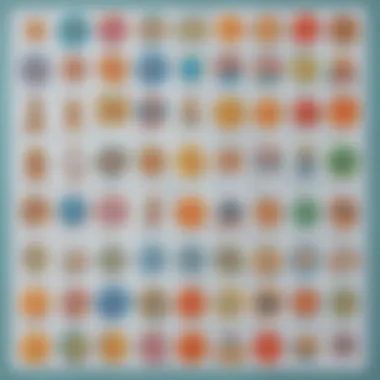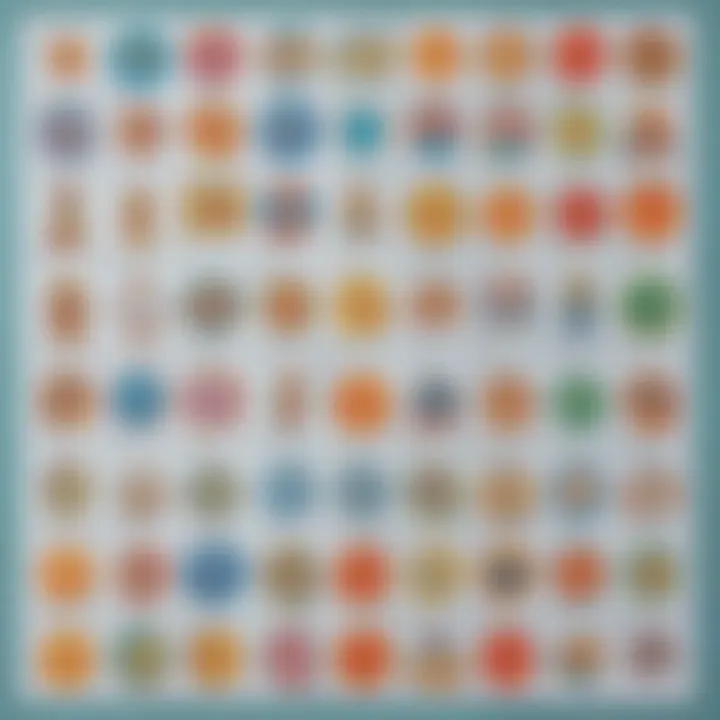Essential Beginner Multiplication Worksheets Guide


Intro
As educational foundations are established, the role of structured learning materials becomes increasingly significant. Multiplication, a cornerstone of mathematics, often presents challenges to young learners. Engaging children with beginner multiplication worksheets is one effective strategy to solidify their understanding and enhance calculation skills.
This article explores the various aspects of these worksheets, their educational value, and how to make the most out of them for effective math learning. By utilizing these resources, educators and parents can help cultivate a positive and engaging environment for mastering multiplication.
Creative Activities
Creative activities play a crucial role in reinforcing multiplication skills while engaging children in a fun way. Worksheets can incorporate various themes and interactive elements, transforming mundane exercises into enjoyable learning experiences.
Craft Ideas
Children can benefit greatly from hands-on activities that complement their worksheets. For example, using colored paper to create multiplication flashcards can aid memorization. Another idea is to use everyday objects, like buttons or small toys, to visually represent multiplication problems. This tactile experience can deepen understanding by providing concrete examples of abstract concepts.
Step-by-Step Guides
- Flashcard Creation: Gather colored paper, scissors, and markers. Cut the paper into small rectangles and write multiplication problems on one side and the answers on the back. Encourage children to test each other using these cards.
- Multiplication Collage: Provide a range of magazines or printouts. Ask children to find pictures that can represent multiplication problems. For instance, they can cut out three pictures of apples and then glue them together with a label stating '3 x 1 = 3' beneath.
- Interactive Board Game: Design a simple board game where children move spaces based on multiplication problems. Create a dice effect where landing on a specific space requires solving a multiplication question to proceed.
Educational Value
These activities foster creativity and critical thinking. By applying multiplication concepts to real-life situations, children can grasp the importance of math in everyday scenarios. Additionally, working on crafts helps improve fine motor skills, essential for early education.
Fun Quizzes
Quizzes can serve as a motivational tool to enhance multiplication skills. They provide a fresh way to assess understanding and keep students interested in learning.
Quiz Topics
Many quizzes available online cover a range of topics, such as:
- Basic multiplication facts
- Word problems involving multiplication
- Timed drills to improve speed and accuracy
Question Types
Effective quizzes include a variety of question types to engage children better:
- Multiple choice: Allows children to select the correct answer.
- Fill-in-the-blank: Encourages recall and application.
- Matching: Connects problems with their solutions, reinforcing knowledge.
Knowledge Reinforcement
Quizzes not only test knowledge but also promote retention. They can help in identifying areas of strength and weakness, allowing targeted study. Regular quizzing can reinforce confidence and contribute to a child’s math fluency.
Fact-Based Articles
Fact-based articles offer an excellent supplementary resource for parents and educators seeking to expand knowledge about multiplication.
Topics
Such articles cover diverse topics, including:
- The history of multiplication techniques
- Effective teaching methods
- Real-world applications of multiplication
Engaging Content
These articles often present information in a conversational and accessible manner, making it easier for young learners to digest complex ideas. They may also include visuals and interactive elements, which can enhance understanding and retention.
Prolusion to Beginner Multiplication Worksheets
Beginner multiplication worksheets offer an effective tool for introducing young learners to multiplication. Mastering multiplication is a fundamental skill in mathematics. It lays the groundwork for more advanced concepts, such as division, fractions, and algebra. These worksheets provide structured practice, enabling children to develop a solid understanding and confidence in their abilities. When students engage with multiplication exercises, they not only learn how to solve problems but also enhance their critical thinking and problem-solving skills.
Significance of Multiplication Skills
Multiplication skills are essential for academic success. They support various day-to-day tasks, from managing finances to cooking and shopping. Furthermore, understanding multiplication can improve skills in geometry and statistics, making it a versatile tool in mathematics.
"The mastery of multiplication can open doors to further mathematical learning and real-world applications."
Without a strong grasp of multiplication, students may struggle with higher-level math. Therefore, targeting multiplication early in education is crucial.
Educational Goals for Early Math Learning
Early math learning aims to establish a foundational understanding of number sense. One of the key educational goals is ensuring students can recognize patterns and relationships among numbers. Worksheets serve as an excellent resource to reinforce these concepts. They help to:
- Foster a positive attitude towards learning math.
- Build essential problem-solving skills.
- Encourage systematic approaches to tackling multiplication problems.


By integrating worksheets into early education, teachers and parents can set children up for long-term success. A strong foundation in basic arithmetic skills will support later learning in mathematics and related disciplines.
Benefits of Using Worksheets
Worksheets serve a crucial role in the realm of early mathematics education. They provide a structured framework that aids learners in grasping the essentials of multiplication. Understanding the importance of worksheets can greatly enhance a child's educational experience. The specific advantages come from three main aspects: the structured environment they create, the way they reinforce learned concepts, and their function in assessing student progress.
Structured Learning Environment
A structured learning environment is vital for young learners. Worksheets offer clarity and organization, allowing students to focus on multiplication without distractions. When children engage with worksheets, they typically follow a logical progression of skills. For instance, a worksheet might start with simple problems, gradually increasing in complexity. This sequence helps build confidence and establishes a sense of routine.
This environment supports consistent practice, a key component in developing fundamental skills. When students know what to expect, they can approach tasks with an open mind, leading to deeper understanding. As they become more comfortable with multiplication, their excitement for math can be sparked.
Reinforcement of Learned Concepts
Worksheets play an integral role in reinforcing knowledge. After instruction, students often need practice to solidify what they have learned. By working through multiplication problems on worksheets, children revisit concepts in a structured way. This repetition is not merely rote learning; it helps bridge the gap between understanding and application.
To illustrate the importance of this reinforcement:
- Worksheets can feature various types of problems.
- They provide immediate feedback since children can check their answers.
- This allows them to identify and correct mistakes in real-time.
Overall, worksheets guide students to move from theoretical exercises to practical use of multiplication in varied contexts. This process consolidates their knowledge and fosters greater retention.
Assessment of Progress
Another significant benefit of worksheets is their role in assessing student progress. Regularly completing worksheets enables educators and parents to identify where a child excels or struggles. They serve as valuable tools for monitoring growth in multiplication skills.
Teachers can analyze completed worksheets to:
- Gain insights into common mistakes or misconceptions.
- Tailor future lessons to target these areas.
- Encourage students in their educational journey by highlighting their advancements.
Moreover, parents can use worksheets at home to keep track of their child's learning outside of school. This assessment feature is essential in ensuring a well-rounded understanding of multiplication concepts.
In essence, worksheets provide a multifaceted approach to learning. They create a structured setting, reinforce crucial skills, and allow for ongoing assessment. Together, these elements significantly contribute to a child's mathematical foundation.
Types of Beginner Multiplication Worksheets
When introducing multiplication to young learners, it is essential to select appropriate worksheets. Different types of worksheets cater to varied learning styles and help develop mathematical concepts effectively. In this section, we will explore the three main types of beginner multiplication worksheets: traditional worksheets, interactive worksheets, and digital resources. Each type presents unique advantages that can enhance a child's understanding of multiplication.
Traditional Worksheets
Traditional worksheets are paper-based exercises. They usually include a variety of problems, such as single-digit multiplication, word problems, and fill-in-the-blank questions. These worksheets foster fundamental skills in a structured manner.
The clear format allows children to practice multiplication repeatedly. This type of worksheet encourages skill reinforcement through repetition. Many learners benefit from this hands-on approach, as they can physically write down their work. Additionally, traditional worksheets promote focus and discipline.
Some key aspects of traditional worksheets include:
- A variety of problem types to challenge the student
- Clear instructions that guide the learner through the material
- Opportunity for quick assessment by parents or educators
Interactive Worksheets
Interactive worksheets provide a more engaging experience for students. These worksheets often include colorful visuals, puzzles, and games that aim to make multiplication fun. By incorporating interactive elements, learners can engage with the material more actively than with traditional formats.
These worksheets not only capture children's interest but also help them connect multiplication with practical applications. For instance, an interactive worksheet may require learners to solve multiplication problems that relate to everyday scenarios, enhancing contextual understanding. This can lead to a deeper appreciation for the multiplication process.
Interactive worksheets can offer:
- Visual stimulation to boost engagement
- Opportunities for collaboration through group activities
- Immediate feedback in some cases, allowing for corrections and adjustments to understanding
Digital Resources
Digital resources expand the horizon of learning beyond paper. Online platforms offer a vast range of digital worksheets. These can feature animated exercises, quizzes, and mobile applications designed to practice multiplication.
Using digital resources allows for personalized learning experiences. Students can work at their own pace, and many platforms adjust difficulty based on performance. This adaptive method ensures that learners remain challenged without feeling overwhelmed. Additionally, many digital resources provide instant feedback, which can be essential for learning.
Notable features of digital resources include:
- Accessibility from any device with internet access
- A broad selection of materials, often customizable for individual needs
- Engaging media that captures children’s attention and encourages continuous learning
"Choosing the right type of worksheet can have a significant impact on a child’s readiness to master multiplication skills."
In summary, the types of beginner multiplication worksheets—traditional, interactive, and digital—each play a significant role in fostering multiplication skills in young learners. The selection of the appropriate worksheets can enhance understanding and engagement, paving the way for future success in mathematics.
Finding Free Worksheets Online


Finding free worksheets online is crucial for educators, parents, and caregivers aiming to support young learners in mastering multiplication. Online resources provide an accessible way to enhance learning without the burden of financial constraints. These worksheets not only offer various formats and styles but also cater to different learning preferences. In today’s digital age, the abundance of resources can lead to finding targeted materials that align with specific educational goals.
Educational Websites
Numerous educational websites specialize in providing free worksheets tailored for young students. Websites like Education.com and Teachers Pay Teachers have extensive libraries of resources. They typically categorize worksheets by subject, grade level, and skill type. Here, users can find simple multiplication exercises or more complex worksheets that promote critical thinking skills. Many of these websites also allow users to print the worksheets for offline use.
Key Benefits of Educational Websites:
- Variety of Content: Each site offers a diverse range of worksheets to keep learning engaging.
- User-Friendly Interfaces: Most educational websites are designed for easy navigation.
- Supplementary Materials: Often, these websites provide additional teaching resources such as lesson plans and instructional videos.
"Many parents overlook the potential of online educational websites for free worksheet access."
Government and Non-Profit Resources
Several government and non-profit organizations make an effort to provide free educational resources, including multiplication worksheets. Websites such as the U.S. Department of Education or National Education Association offer tools and materials that can be beneficial for early math learning. These resources often focus on promoting equity in education by providing free access to high-quality educational content.
Considerations for Government and Non-Profit Resources:
- Credibility: These resources are typically vetted for educational quality.
- Focus on Curriculum Standards: Many materials align with national or state learning standards.
- Inclusive Material: Resources cater to diverse learning needs, supporting inclusivity in education.
Community Sharing Platforms
Community sharing platforms offer another valuable source for free multiplication worksheets. Websites such as Reddit’s r/Teachers and Facebook groups provide spaces where educators and parents can share resources. Users often post worksheets they have used or created, making these platforms a treasure trove of practical materials from real experiences.
Advantages of Community Sharing Platforms:
- Peer Recommendations: Users can gauge the effectiveness of materials through community feedback.
- Innovative Ideas: Access to creative teaching strategies from fellow educators.
- Collaborative Learning: Encouragement of idea exchanging fosters a sense of community among users.
How to Use Worksheets Effectively
Using worksheets effectively is crucial for helping young learners grasp multiplication concepts. Worksheets serve not just as tools for practice, but they are instrumental in reinforcing what children have learned in class. By incorporating them into everyday learning, parents and teachers can create a more robust educational experience. The integration of worksheets into a child's daily routine can be both structured and flexible, catering to different learning styles and paces.
Integrating Worksheets into Daily Learning
Integrating worksheets into daily learning routines makes math a regular part of life. This consistent practice is fundamental in building a strong multiplication foundation. Parents or teachers can assign different worksheets every day. Alternatively, setting aside specific time slots for completing these worksheets can help establish a routine.
- Use them during homework time: Incorporating multiplication worksheets into existing homework routines can enhance understanding.
- Morning or evening practice: Short sessions of worksheet practice before or after school can help solidify concepts.
- Combining with other subjects: Use math worksheets in conjunction with science or reading activities, emphasizing the connection among subjects.
Implementing flexibility in this approach allows for creativity. Worksheets might also be used in small group settings, promoting collaboration while ensuring individualized attention.
Tailoring Worksheets to Individual Needs
Every child learns differently, and tailoring worksheets to meet those unique needs is vital. Customization can involve adjusting the difficulty level of the worksheets based on the learner’s ability. For instance, students with basic skills can engage with simpler multiplication problems while those advancing can tackle more complex calculations.
- Monitor Progress: Track where a child struggles and adjust the content accordingly.
- Use interests to motivate: Design worksheets that incorporate themes or interests, such as animals or space, to make learning relevant.
- Provide varied problem types: Mixing in word problems, visual arrays, and numerical equations keeps students engaged and helps in reinforcing learning
Overall, by modifying the content and format, educators can ensure learners remain challenged yet confident.
Encouraging Self-Directed Learning
Encouraging self-directed learning through worksheets fosters independence in young learners. When students take the initiative to complete worksheets on their own, they build important skills. Self-direction also allows them to explore multiplication at their own pace.
- Set goals: Encourage children to set personal goals about completing a certain number of worksheets per week or improving their accuracy.
- Provide choices: Let learners choose which worksheets interest them the most, thus giving them ownership over their learning.
- Reflection on learning: After completing worksheets, have students reflect on what they learned, what they enjoyed, and where they felt challenged.
Encouraging students to take an active role in their learning can lead to increased motivation, a more profound understanding of the material, and better retention of skills.
In summary, effectively using worksheets involves thoughtful integration into the daily learning process, individual customization, and the encouragement of self-directed learning. These strategies, tailored to fit various learners, ensure that worksheets remain valuable resources that contribute significantly to mastery of multiplication skills.
Engagement Strategies for Young Learners
Engagement is a crucial element in the educational experience, especially for young learners who are just beginning their journey with multiplication. Using effective engagement strategies can stimulate interest and motivation in children. When students are engaged, they are more likely to absorb information and develop essential skills necessary for their academic growth. The significance of incorporating such strategies into multiplication worksheets cannot be understated, as they create a dynamic learning environment that encourages curiosity and exploration.
Incorporating Games and Activities
Games and activities can transform the learning process from a stagnant task into an interactive experience. When learners use games, they often do not realize they are practicing multiplication. For instance, using board games, flashcards, or online quizzes can make the multiplication learning process enjoyable. Simple activities such as multiplication bingo or scavenger hunts where children must solve problems to find the next clue help reinforce concepts in a fun way. The immediacy of rewards—like tokens or points—can boost motivation to engage more fully in multiplication tasks.
Benefits of games and activities include:
- Enhanced Motivation: Fun elements make learning appealing.
- Improved Retention: Engaging interactions help cement information for longer periods.
- Social Skills Development: Participating in group games promotes teamwork and communication.
Incorporating these elements can significantly enhance learning. It shifts the focus from pure rote memorization to a more enjoyable exploration of mathematical concepts. The excitement brought by games fosters a love for learning and reduces the anxiety often associated with math.
Connecting Multiplication to Real-Life Scenarios


Relating multiplication to real-life situations is vital for contextual understanding. When young learners see the practical application of multiplication, their comprehension deepens. For example, a child could learn to multiply through real-world tasks such as calculating the total cost of multiple items while shopping. This connection makes the subject relevant and can lead to increased interest in exploring multiplication further.
Consider these examples of real-life applications:
- Cooking: Measuring ingredients often involves multiplication when adjusting recipes.
- Sports: Keeping score in games where every point relates to multiplication tables.
- Daily Activities: Estimating time, distance, or quantities required for various tasks.
Discussing these scenarios during multiplication practice can make the content relatable. It introduces a level of realism that enhances understanding and helps young learners grasp why multiplication is necessary beyond the classroom.
Engagement strategies like incorporating games and linking lessons to everyday life serve a dual purpose. They make multiplication not only enjoyable but also meaningful, facilitating a deeper understanding of the material.
Evaluating Worksheet Effectiveness
Evaluating worksheet effectiveness is crucial in understanding how well beginner multiplication worksheets serve their intended purpose. This component encompasses various methods to assess student learning and engagement levels when using these worksheets. By systematically evaluating these resources, educators and parents can determine their impact on students’ mathematical abilities and make necessary adjustments to improve learning outcomes.
Tracking Student Progress
Tracking student progress is a fundamental aspect when evaluating the effectiveness of multiplication worksheets. Monitoring how a child performs over time provides insights into their understanding of multiplication concepts. Regular assessments can highlight strengths and weaknesses in their knowledge.
For example, educators can analyze completed worksheets to identify specific areas where a student excels or struggles. This can lead to more focused instructions that cater to individual needs, ensuring that each learner receives the support they require. Utilizing tracking tools like simple checklists or spreadsheets can make this monitoring more efficient. Regular feedback can also motivate students to improve as they see tangible results of their efforts.
Adapting Teaching Methods Based on Feedback
Feedback is an essential component of effective teaching. When using multiplication worksheets, it is important to adapt teaching methods based on the observations made from student performance. For instance, if certain methods do not seem to resonate with students, teachers might consider exploring alternative strategies. This may include modifying worksheets to introduce varying difficulties or incorporating visual aids.
Discussing worksheet outcomes with students can also open avenues for communication. By understanding their experiences and challenges, educators can tailor lessons to foster a more engaging learning environment. Furthermore, engaging parents in feedback loops can enhance the overall support system for the student. This can involve sharing insights about both successes and struggles observed during worksheet activities, creating a collaborative approach to learning.
Further Resources for Educators and Parents
Understanding and utilizing further resources for teaching multiplication is essential for both educators and parents. In the realm of early mathematical education, various materials enhance the effectiveness of worksheets. These resources provide methods and ideas that help to reinforce multiplication concepts. They support structured learning and effective teaching methods.
The resources can vary from books to digital content and professional training. Each resource offers unique benefits. For educators, these tools can improve their teaching strategies. For parents, they create opportunities for more guided learning experiences at home. Given the significance of a firm mathematical foundation, these resources are worthwhile to explore.
Books and Publications
Books and publications provide crucial insights into teaching multiplication. They often cover fundamental strategies, best practices, and various techniques. Educational books, like "Teaching Basic Multiplication" by Mary Johnson, offer structured approaches. They guide teachers on how to present concepts clearly.
Additionally, parents can benefit from publications that focus on practical exercises to do at home. These guides show how to integrate multiplication into daily activities. This can make practicing math more enjoyable for children.
Some popular books include:
- "Math Made Easy" by Susan Jones
- "The Multiplication Facts Workbook" by Karen Smith
These types of resources often include:
- Step-by-step instructions
- Sample problems
- Creative activities to engage children
Accessing reputable sources can make a difference in learning outcomes. Check local libraries, online platforms, or educational websites for material suitable for different learning levels.
Webinars and Workshops
Webinars and workshops are modern tools that offer professional development and hands-on training for educators and parents. They allow people to learn in an interactive setting. Often hosted by experts in education, these sessions focus on effective strategies for teaching multiplication.
Educators attending these events can gain practical skills and new perspectives. They learn how to design engaging lessons that cater to various learning styles. Parents can also attend to understand better how to support their children at home.
Many organizations offer these sessions, such as:
- National Council of Teachers of Mathematics (NCTM)
- Educational Development Center (EDC)
Benefits of attending:
- Networking opportunities with other educators
- Access to a wealth of resources after sessions
- Practical tips to implement new strategies immediately
These resources greatly enhance the learning journey for children. They provide valuable guidance on how to effectively approach multiplication concepts.
Closure
The conclusion encapsulates the essence of the discussion on beginner multiplication worksheets. It serves as a summary of key insights and reinforces the ongoing relevance of multiplication mastery in the formative years of education. Understanding multiplication is not just about memorizing facts; it is foundational to advanced mathematical concepts. Worksheets offer structured guidance and reinforce these skills in a methodical manner.
The Ongoing Importance of Multiplication Mastery
Multiplication is a cornerstone of mathematics. It transcends mere numbers and operates as a vital tool for problem-solving in various real-life applications. As students progress through their educational journey, mastery of multiplication enables them to tackle more complex mathematical concepts such as division, fractions, and algebra.
Research shows that early competence in multiplication can lead to increased confidence in math overall. This confidence translates into a willingness to engage with more challenging material as students advance. Additionally, repeated practice through worksheets aids in developing fluency, allowing young learners to recall multiplication facts quickly and accurately.
Encouraging a Positive Learning Experience
Creating an encouraging atmosphere around learning multiplication is essential. Worksheets provide not just challenges but also a sense of achievement as students complete exercises and see their progress. This can be particularly vital in maintaining motivation and interest in mathematics.
Using a variety of worksheets—traditional, interactive, and digital—allows parents and educators to cater to individual learning styles. Finding ways to link multiplication to real-world scenarios can further enhance understanding. For instance, discussing multiplication when cooking or shopping helps students grasp its practical applications, reinforcing the material learned in worksheets.
In summary, promoting the ability to multiply equips students with valuable skills. Worksheets are integral to this process, offering structured lessons and allowing for assessment of progress. Encouraging a positive and supportive environment comes from using these resources effectively. The journey of mastering multiplication not only serves immediate educational goals, but also sets the stage for future success in mathematics.







